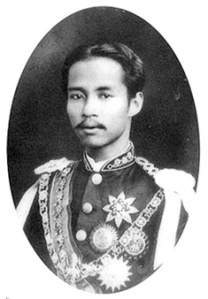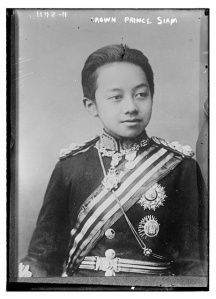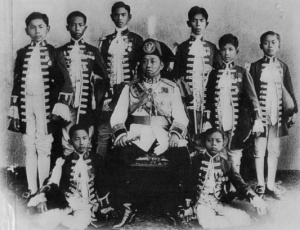This excerpt, from Chapter One, “The Triple Supremacy,” opens the story of a young Siamese prince sent abroad to study in Britain who comes home to Bangkok at the turn of the 20th Century. Vajiravudh dreams of his own paradise as one of male feasting, friendship and story-telling — only to find himself thrust into the role of a king who must balance the beliefs of Siam’s polygamous sexual culture against the colonial demand of European empires that the only civilized nations are those that follow the new “triple supremacy” of romantic, heterosexual monogamy.
The death had come quite unexpectedly.
Stomach trouble had begun a week earlier. Then the coma.
But forty-eight hours before the end, the First Queen — there were many queens — had been reporting that the king was fine, that “His Majesty has improved in all respects.”

The king was not especially old, only fifty-seven. He was the only king most of his subjects had known, having ascended the throne four decades earlier when he was still a teenager.
It was October 23, 1910. The son who was about to become king was still asleep in his own palace about two miles away. As was tradition, once royal sons came of sexual age — about eleven or twelve — they left their father’s palace so as to be away from thepresumed temptation of the king’s expansive Inner City of women. It was this protected Inner City that had provided one of the most important means of male royal control of the Siamese empire, and so the women’s sexuality needed close regulation. Even non-royal minor wives swore an oath to report not only any sexual liaisons they or others had with men but any they had with each other too. So far, with the help of the women of the Inner City, the first five kings of the Chakri Dynasty had fathered 324 children by 176 wives. That was an average of sixty-five children and thirty-five childbearing wives per king, sufficient to solidify the bonds among powerful families as well as supply enough royal males to run the imperial bureaucracy.
Reproductive sex, not romance and certainly not monogamy, was key to any Siamese king’s power, and young princes were expected to immediately acquire their own women.
Chulalongkorn, the king who lay dying, had come to be known as one of Siam’s greatest rulers: They called him Phra Phuttha Chao Luang, which means something like “The
Royal Buddha,” an important indication not only of his secular but his spiritual status, something European kings had long foregone and, at any century, had always had to share with the Roman pope. Over the course of Chulalongkorn’s reign, from age fifteen to age fifty-seven, more than 150 women had been given to him as minor wives, double the average and triple the number that had been acquired by his own father. As a vigorous teen, he had fathered children with two concubines even before he had reached the age of fifteen. Inside the royal palace, the Inner City was populated and fully administered by women — and protected by three walls. At its height under Chulalongkorn, it held about 3,000 women, counting all the queens, princesses, their servants, and slaves. Of those, thirty-five had borne Chulalongkorn seventy-seven children, which included thirty-three sons.

In 1881, when the king was twenty-eight years old, child number thirty-nine — son number twelve — had been born. He had been named Vajiravudh.
He was still in his bed at his own Saranrom Palace when the notification came that Sunday morning. It’s not certain what he had been doing the Saturday night before, but if it was a typical Saturday night, he would have been awake as late as 3:00 a.m. or 4:00 a.m. or even 5:00 a.m., engaging in nighttime games and storytelling with the courtiers who surrounded him — all males, all young, most of them commoners rather than the usual royal cousins and brothers.
Although Vajiravudh was already twenty-nine years old — a year older than Chulalongkorn was when Vajiravudh was born — the crown prince had proven quite unlike his father when it came to sex. He had not yet taken any concubines or wives and

had had no children whatsoever. He had not even tried, at least as far as was known publicly. Instead, Saranrom with its splendid Chinese-style pagodas and Victorian buildings, its forests and meticulous gardens, had become a male island in the Chakri capital of Bangkok.
To the Siamese, Vajiravudh was a puzzle of manhood, almost like someone come from another land to set up a different home in the center of a traditionally ordered village. Maybe that was not surprising, since he had been sent at age twelve not just across the city of Bangkok for his formative adolescence but all the way to London. At the time, no one had any idea he would become king. A half-brother had been designated for that role and was being kept safe for his own education in Bangkok. Like the dozens of other sons, Vajiravudh initially had more freedom to discover what else he might be interested in doing rather than ruling.

That, as it turned out in London, had been theater. He loved the London plays. Siam itself had traditional khon, which were stylized dance and music performances with narratives told by a chorus. But London had spoken drama and comedies organized around strong characters played by individual actors and actresses. Vajiravudh enjoyed the Western approach so much that he would eventually translate some of Shakespeare into Siamese, including one romantic tragedy, Romeo and Juliet, that argued against family interference in personal relationships, and one romantic comedy, As You Like It, in which Shakespeare had planted the famous monologue, “All the world’s a stage.” Writing and theater became Vajiravudh’s passions, and he lived in Ascot, known for its famous royal racecourse.
Circumstances had altered his fate. A few years after Vajiravudh had been sent to London, the half-brother who was supposed to become king had died, and Chulalongkorn had then picked Vajiravudh as his heir. At age fourteen, Vajiravudh went to the Siamese legation in London for a ceremony and then acquired a three-man bodyguard. The new title of Crown Prince enabled him to meet Queen Victoria herself. In a laudatory article about him on April 25, 1895, Vanity Fair noted:
He came to England a year-and-a-half back; and being then nearly thirteen and knowing more of Pali and Sanskrit than of English, he was not sent to school, but confided to the care of a private tutor, who was to coach him for the House at Oxford. But his new Dignity has altered the outlook, and Greek and Latin have been discarded for International Law and Political Economy, subjects whose knowledge is more needed in a coming King. He now talks English with much fluency and a foreign accent; he is fond of mathematics, history, and walking; and he believes in the English gentleman. He is not an athlete, but he takes life very seriously; and he was very kindly received by the Queen in private audience . . . The honours that have been thrust upon him have not at all spoiled him. He is a dignified, polite, very amiable boy of some promise. He is so nice a Prince that no one is jealous of him.
Not all the comments would be so kind. Once Vajiravudh had enrolled in school, his British class chums sometimes subjected him to taunts, nicknaming him “Siam” and teasing him about his father’s well-known lack of monogamy.
“Siam,” a typical salutation would go, “how many brothers and sisters have you?”
The young Vajiravudh had taken the teases good-naturedly but also unapologetically.
“Can’t say,” he had responded. “Haven’t opened my morning’s mail yet!”
Coincidentally, the day after the Vanity Fair story appeared, the British press focused on another type of sexual desire that the Victorians also frowned on: the April 26 start of the gross indecency trial for homosexuality against the noted writer Oscar Wilde. The trial would seal in the popular mind a sense that homosexuality could be explained by adopting what was known as “degeneracy theory” — a sort of reverse evolution that supposedly explained various sorts of sexual immorality and crimes, such as the notion that insanity could be caused by too much masturbation…. It is not clear how much of the London press a teenage Siamese prince would have been reading, but certainly the headlines about Oscar Wilde had been everywhere.

The drive from his own palace at Saranrom to his father’s probably did not take long on a Sunday morning. Fortunately, because of Chulalongkorn’s designation of him as crown prince fifteen years earlier, there would be none of the messiness that sometimes accompanied exchanges of power within an absolute monarchy — and there was no doubt that the empire had just acquired a new absolute monarch. Within the structure of Siam, Vajiravudh now held more power than Queen Victoria had within her empire. He had no Parliament to persuade. He had no Magna Carta of rights to observe, nor any philosophical traditions of free speech from the likes of John Milton or John Stuart Mill. He had no separation of state and religion to contend with; he was ruler of both military and monk. He had no sensationalistic press likely to challenge him — not unless he allowed one. As one observer at the time put it, “When the foreign missionary desires to convey to the Siamese mind the idea of God, he is compelled to use the words ‘pra chow,’ which are already used for ‘King.’ Omniscience, omnipotence, and absolute rightness are the inherent attributes of the King.”
According to a New York Times report, the ceremony of allegiance would be held quickly that same Sunday morning of October 23 in the temple attached to the royal palace. The oath included phrases intended to discourage any sort of dissent or disobedience. All the other princes would pray that “the powers of the deities to plague with poisonous boils and with all manner of horrible diseases” would descend upon “the dishonorable, the disobedient, and the treacherous.”

The prince who had not yet taken a woman had ascended.
The ideals of Saranrom would now be offered as a new center for his empire.
Buy Imagining Gay Paradise from Amazon.com, Barnes & Noble, Columbia University Press, Hong Kong University Press, Silkworm Books, Kinokuniya Thailand, Kinokuniya Singapore, University of British Columbia Press, Eurospan
Add Imagining Gay Paradise to your Goodreads:
